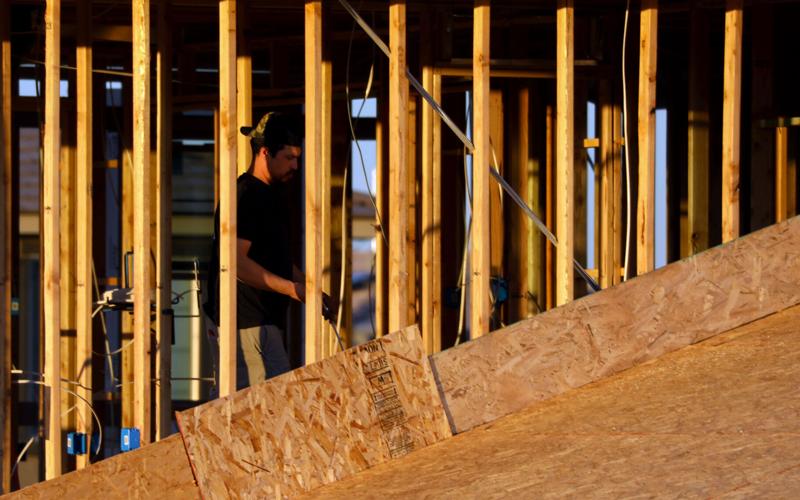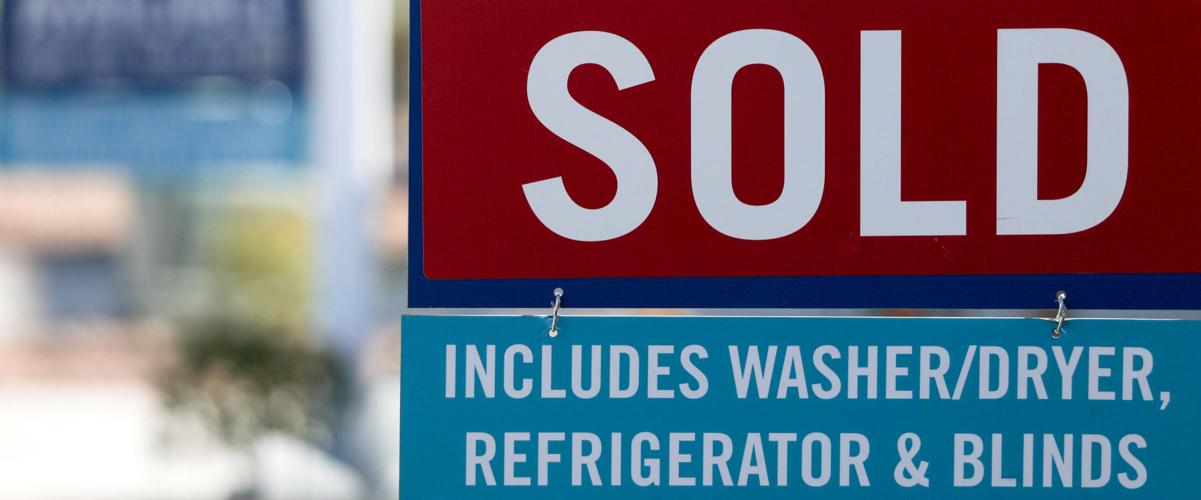PHOENIX ŌĆö Backers of a sweeping housing bill that would allow developers to build small homes on tiny lots and bar large cities from requiring things like fencing or other design elements have realized that theyŌĆÖll actually have to negotiate major changes if they hope to get Gov. Katie HobbsŌĆÖ signature.
Rep. Leo Biasiucci, R-Lake Havasu City, who is sponsoring the Arizona Starter Homes Act in the House, told Capitol Media Services thereŌĆÖs no way to enact legislation developers want ŌĆö and he says first-time homebuyers need to afford a home ŌĆö if they donŌĆÖt negotiate with cities. That acknowledgment came after the housing industry and its mainly Republican supporters in the Legislature refused to make any changes to their nearly identical proposal last year ŌĆö and the measure ended up falling to HobbsŌĆÖ veto stamp.
What they face is stiff opposition from cities and neighborhood groups who donŌĆÖt want lawmakers overriding locally crafted zoning rules.
People are also reading…
Cities argue that tiny lot sizes and setbacks would cram apartment-like density into single-family home neighborhoods.
The city zoning overhaul would also negate what local officials say are carefully crafted city general plans and lead to the use of poor-quality construction materials. They also worry about water and sewer systems being overwhelmed by higher-than-designed demand.

Biasiucci
Biasiucci said he expects a series of meetings with proponents and opponents this week to try to hammer out a deal. He said he had also spoken with the governorŌĆÖs office, knowing that he needs her on board if he is to get anything done on housing affordability.
ŌĆ£We all recognize and we all know that we have to figure something out, and we have to figure something out that everyone will be OK with,ŌĆØ he said.
Hobbs: Bill lacks guarantees
Hobbs cited lack of protections for the stateŌĆÖs military bases in her veto letter last year.
Biasiucci addressed that this year by exempting areas near military airports. But the Democratic governor also echoed many of the arguments raised by city leaders and their association, the League of Arizona Cities and Towns, which was vehemently opposed to the measure.
She ticked off their concerns about higher densityŌĆÖs effects on infrastructure and firefighting ability, water and land use planning.
And then thereŌĆÖs the lack of any guarantee that the proposal will produce more affordable homes ŌĆö and that the beneficiaries will be Arizonans and not developers.

Negotiations are in the works for a sweeping Arizona bill that would let developers bypass many city building rules limiting construction of small homes on tiny lots that backers say first-time homebuyers need to afford a home. Critics say the proposal lawmakers are pushing lacks guarantees it will help first-time home buyers.
ŌĆ£What I donŌĆÖt want to see is a proposal that gives away a bunch to developers without ensuring that it actually addresses the affordability problem and makes housing more available for people who need it,ŌĆÖŌĆÖ Hobbs said just this past week, saying she doesnŌĆÖt want something thatŌĆÖs ŌĆ£a give-away for developers.ŌĆÖŌĆÖ
The effort is prompted by home prices that have soared in the past decade, both in Arizona and across the nation, and a shortage of lower-priced homes
The median price for a detached single-family home in metro Phoenix sat at $430,000 a year ago, a 53% rise just since 2020. Combined with much higher mortgage rates, many people are simply priced out of the market.
None of this is new.
Developers push to preempt city rules
The stateŌĆÖs housing crisis was years in the making, with builders essentially shutting down new home construction after the mortgage and foreclosure crisis that hit in 2007 and not reaching pre-meltdown building levels until more than a decade later. Meanwhile, the stateŌĆÖs population kept growing, leading to todayŌĆÖs shortage of homes.
Developers are now pushing lawmakers to preempt city rules on lot sizes, building materials and shared amenities like fencing, arguing that could help them offer buyers cheaper ŌĆ£starter homes.ŌĆÖŌĆÖ
BiasiucciŌĆÖs legislation, and an identical bill introduced by Sen. Shawnna Bolick, R-Phoenix, would ban larger cities from requiring lot sizes of more than 1,500 square feet in developments of 5 acres or more. It also bars cities from requiring that homes be set back more than 10 feet from the front or rear lot line and more than 5 feet on either side of a home.
Also barred would be any city design rules or fencing requirements and any neighborhood amenities like landscaping that would require maintenance by a homeownersŌĆÖ association, among other provisions.

Rising home prices combined with much higher mortgage rates means many Arizonans are priced out of the housing market.
The measure is crafted to apply to fewer than 20 of the stateŌĆÖs 92 cities and towns, those with populations of 70,000 or more, a move designed to blunt opposition from elected officials and lawmakers from smaller communities, figuring itŌĆÖs not their fight.
Last yearŌĆÖs version barely passed the House and Senate, but it drew bipartisan support ŌĆö and opposition. Democrats, most vocally Sen. Analise Ortiz of Phoenix, have joined Biasiucci and Bolick in championing the starter homes bill.
Cities, however, have gone on the offensive.
A counter starter-home bill
They point to many efforts theyŌĆÖve taken to boost housing supply, ease permitting delays and approve new zoning change and permits requests. They note that cities and towns have issued more than 316,000 housing permits since 2020.
And then there are practical issues.
The ban on cities requiring that a home be built more than 10 feet from the street would make it virtually impossible to create a home driveway large enough for all but the tiniest auto, according to Tom Savage, legislative director of the League.
ŌĆ£ThereŌĆÖs no way youŌĆÖre going to be able to park a car in your front driveway under the Starter Home Act with the 10 foot (setback),ŌĆÖŌĆÖ he said. ŌĆ£Somebody did the math and said that you probably wouldnŌĆÖt even be able to park a Smart car in your driveway,ŌĆÖŌĆÖ let alone a full-size pickup truck.
In a bid for compromise, the League last week proposed its own version of the starter home bill.
That legislation would require cities to allow 10% of any new developments of 10 acres or more to contain lot sizes of 4,000 square feet.
A home could be built no closer than 20 feet from the front lot line and 10 feet from the back line, with combined side spacing of 15 feet. That would pack up to 9 homes per acre, while the developer proposal would allow 24 homes on each acre of land.
Savage noted that under the proposal for minimum lot sizes, setbacks and lot coverage areas being pushed by developers and groups like the Homebuilders Association of Central Arizona, a single-story home could only be about 600 square feet in size and a two-story home just 1,200 square feet.
ŌĆ£ThatŌĆÖs certainly not a very large home thatŌĆÖs going to be able to support a family,ŌĆØ Savage said. ŌĆ£That might be more appropriate for a single person, but if youŌĆÖre factoring in a family, a 600-square-foot home is just not going to cut it.ŌĆÖŌĆÖ
He said cities are trying to respond to builders who see a real need for smaller and cheaper new homes while also ensuring prospective homeowners have some elbow room and avoiding overwhelming infrastructure like roads, water and sewer systems.
The League proposal also applies to far more cities ŌĆö 30 in all, each with populations of 30,000 or more. The proposal says cities canŌĆÖt require backyard landscaping or patios and has no say in interior floor plans outside of regular fire and safety rules and building codes.
Lawmaker: ŌĆśThereŌĆÖs got to be some give-and-takeŌĆÖ
And thereŌĆÖs something else: It requires that homes built under the new standards actually be sold to Arizona residents, arenŌĆÖt snapped up by investors and are affordable. The proposal allows cities to either set sales price limits or require that homes be occupied for at least 15 years by lower-income Arizonans.
The income limits proposal is a non-starter for him, and for Ortiz, Biasiucci said.
ŌĆ£Doing that will just block out the people that need houses the most like teachers, nurses, police officers, etc.,ŌĆÖŌĆÖ he said. He said he also opposes the occupancy time requirement, noting that people might need to move for their jobs or face a layoff and need to sell their home.
And what of ensuring Arizonans benefit?
ŌĆ£I do think we can figure out a way to make sure these homes arenŌĆÖt just gobbled up in mass quantities by corporations,ŌĆÖŌĆÖ he said.
Sen. Vince Leach, R-Tucson, said heŌĆÖs supportive of both proposals and agreed to sponsor the League proposal as part of an effort to get opponents to come to the table.
ŌĆ£IŌĆÖm trying in my own humble way to pull two sides together,ŌĆØ Leach said, noting that he watched from the outside ŌĆö he was defeated in his 2022 reelection bid and got his seat back just this year ŌĆö as last yearŌĆÖs battle developed, and is concerned that thereŌĆÖs no change this year.
ŌĆ£I donŌĆÖt have a magic wand ŌĆö I just want to bring people together,ŌĆÖŌĆÖ he said, noting a series of tough compromises heŌĆÖd been involved as a lawmaker in previous years. ŌĆ£We brought people together ŌĆö and we did it by sitting down with what some people think are adversaries.ŌĆÖŌĆÖ
Biasiucci said heŌĆÖs ready for compromise and vowed to keep working on his bill until thereŌĆÖs a breakthrough. He said he wants Hobbs and everyone else involved in talks.
ŌĆ£We want them at the table because my goal is not to get a veto,ŌĆÖŌĆÖ Biasiucci said.
ŌĆ£My goal is to get something signed,ŌĆØ he continued. ŌĆ£If weŌĆÖre going to put all this work in, I need their input. I need the citiesŌĆÖ input. I need legislatorsŌĆÖ input. I need everybodyŌĆÖs input.ŌĆÖŌĆÖ
Still, he acknowledged, what emerges is not going to please all sides.
ŌĆ£But I think everybody needs to also understand that we have to do something,ŌĆÖŌĆÖ Biasiucci added.
ŌĆ£So thereŌĆÖs got to be some give-and-take,ŌĆÖŌĆÖ he said, especially with the recognition that if the governor, with her veto stamp, is not on board, it means no movement toward more affordable homes.
ŌĆ£But that canŌĆÖt be an option, said Biasiucci. ŌĆ£We canŌĆÖt just keep doing nothing in my opinion.ŌĆÖŌĆÖ















